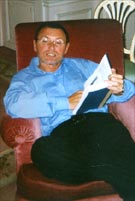"They're all dreaming, everybody's dreaming, but
I'm dreaming the hardest"
- Marilyn Monroe
Well, we'd have to say glorious things about the man, wouldn't we? After
all, he's the man in charge.
He was born in Aalst, East Flanders, and it was the Flemish who pioneered
the 'warts and all' portrait. That is why he loves a remark his wife has
made: 'Walter is an anarchist - as long as he's the boss'. He thinks that's
a good joke - everybody enjoys humour, but De Brouwer's loud laugh is legendary,
especially when the gags are accurate, are fresh, and are made up of some
startling paradox.
Actually, these days, Walter De Brouwer is dreaming the hardest. For
a long while he expressed his distaste for hasty, result-driven research
by quoting the slogan 'We promise never to make anything that works'. In
his public presentations he pulls listeners up short by refusing to affirm
the virtues of teamwork; it is individualism that he wants to promote,
since he knows that 100 brilliant solo singers can make a very special
choir. Among many other surprising notions he has dreamed up is his determination
not to avoid problems. Indeed it is with his encouragement that researchers
at Starlab actively seek problems - the more fundamental and new the problem
may be, the more it is relished. For Walter, Starlab may actually be defined
as a place where new problems are addressed, new questions are asked and
new thoughts are minted. It is also a place where old ideas are re-examined,
modified, reconsidered, altered and improved.
To begin with there were some who had qualms, which no 'warts and all'
portrait could ignore. In most cases paradoxes reared their heads, and
what people criticised us for, Walter De Brouwer actively cultivated. He
is phenomenally quick-witted; he makes far-sighted decisions faster than
the speed of light. Why would he preach long-term thinking, sober reflection
and a slow and steady consideration of the Deep Future? Because some serious
problems need extended attention to be paid to them, and because' contradictions
are our hope. Why would Walter pick as his heroes the physicist, bongo-player
and party boy Richard Feynman or the chubby maths prodigy Ramanujan? Because
they were 'half-Gods', geniuses who came from ordinary beginnings, real
people; because they were human. Why on earth would Walter'be bold enough
to use the example of Madonna as a business model? Because she has been
consistently brave, because she has managed to stay at the top for the
long haul, because she has made her own rules, and because she has constantly
invented and reinvented herself.
Walter was trained as a philologist/mathematician and was a researcher
for six years, but in 1990, he left academia to become a businessman. His
company, Riverland, became the leading publisher of IT magazines in the
Benelux. VNU bought the portfolio in December 1995, leaving Walter De Brouwer
with enough money to start a period of extreme entrepeneurship which led
to the foundation of a wide range of companies mostly under the Riverland
banner that were successively sold, some even became parts of big IPO’s.
Riverland Networks was sold to Wegener-Arcade, Riverland Consultants to
TEQ, Caulfield & Tensing merged into the stable of BBDO, Ping was sold
to Eunet International and later emerged as KPNQwest, Eunet International
itself was sold to Qwest Communications, Riverland Next Generation and
Riverland Holding were sold to Keyware, and Jobscape was taken over by
Stepstone before the float.
After this Walter's investments became more and more entrenched in the
financial world: IPOscoQe (Belgium, ex-Easdaq founder), Business Models
(VC, France), Pythagoras (VC, Belgium), Roccia Ventures (VC, South America),
via Mammelfish (USA). He does not cultivate a lot of advisory board functions
but keeps just a few: for investments in biotech and IT in Petercam, the
largest independent member firm of the Brussels Stock Exchange, for Zomedia
(UK) a company that will surprise the world of TV and for Yeahlab (Holland)
on mobile bandwith among others. In 1996 Walter set up STARLAB. Starlab
is unique in Europe and pretty rare wherever you go as a centre for basic
research. It was in Walter's mind at the time he established the institute
that,
whether or not any disaster struck our planet, he would be able to
house under one roof enough brainpower and knowledge to kick- start our
civilisation. He also wanted it to be 'payback time' for scientists and
scholars who had not been sports heroes at school and had not been rewarded
for their discoveries. Starlab would embody the 'revenge of the supernerds',
and central to its operation would be the bringing of entrepreneurship
to'science and science to entrepreneurship. Walter de Brouwer loves the
atmosphere of Europe, with its traditions, its understanding that 100 years
means nothing, its lawns and forests take time to grow, its slow food,
fine wines and scintillating, cultured conversations.
His mother always told him that he would find the right woman one day.
What she did not tell him was that it would take him more than 30 years
and a lot of misery to find her. But she was worth the wait.
Walter De Brouwer is 44 and has three children. He wants them to think
that 'Daddy was a rolling stone.' What they will know is that Daddy gained
a great deal of the best kind of moss, that their Daddy was doing what
he did because of their futures and because of the futures of their children,
grand children and great- great- great- great grandchildren to come, and
that their Daddy spent his life in the hope that future businesses will
be called to account in terms of three standards: economical, ethical and
environmental.
What Walter De Brouwer's children will know is that Daddy was fully
prepared to be seen as he really was 'warts and all', and that he spent
his days working, thinking, planning, partying, laughing, and dreaming
the hardest.

